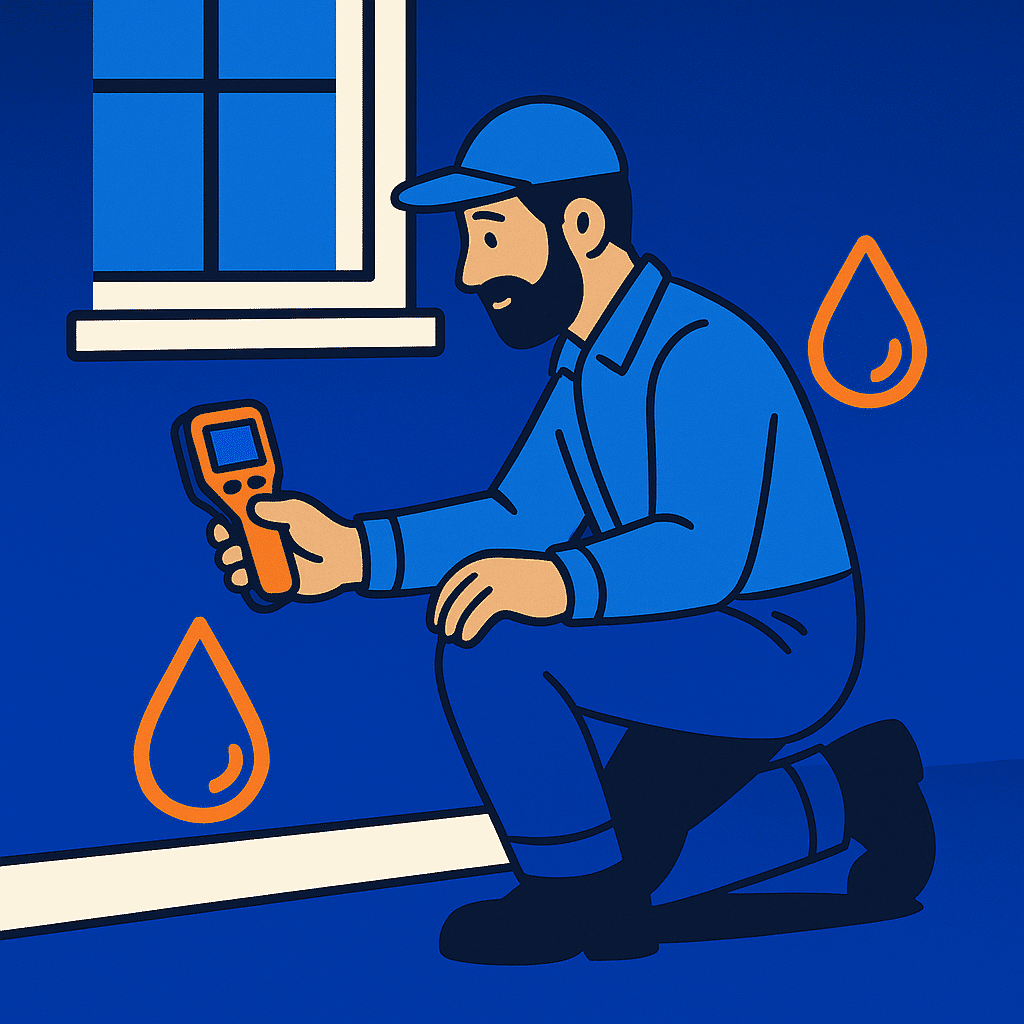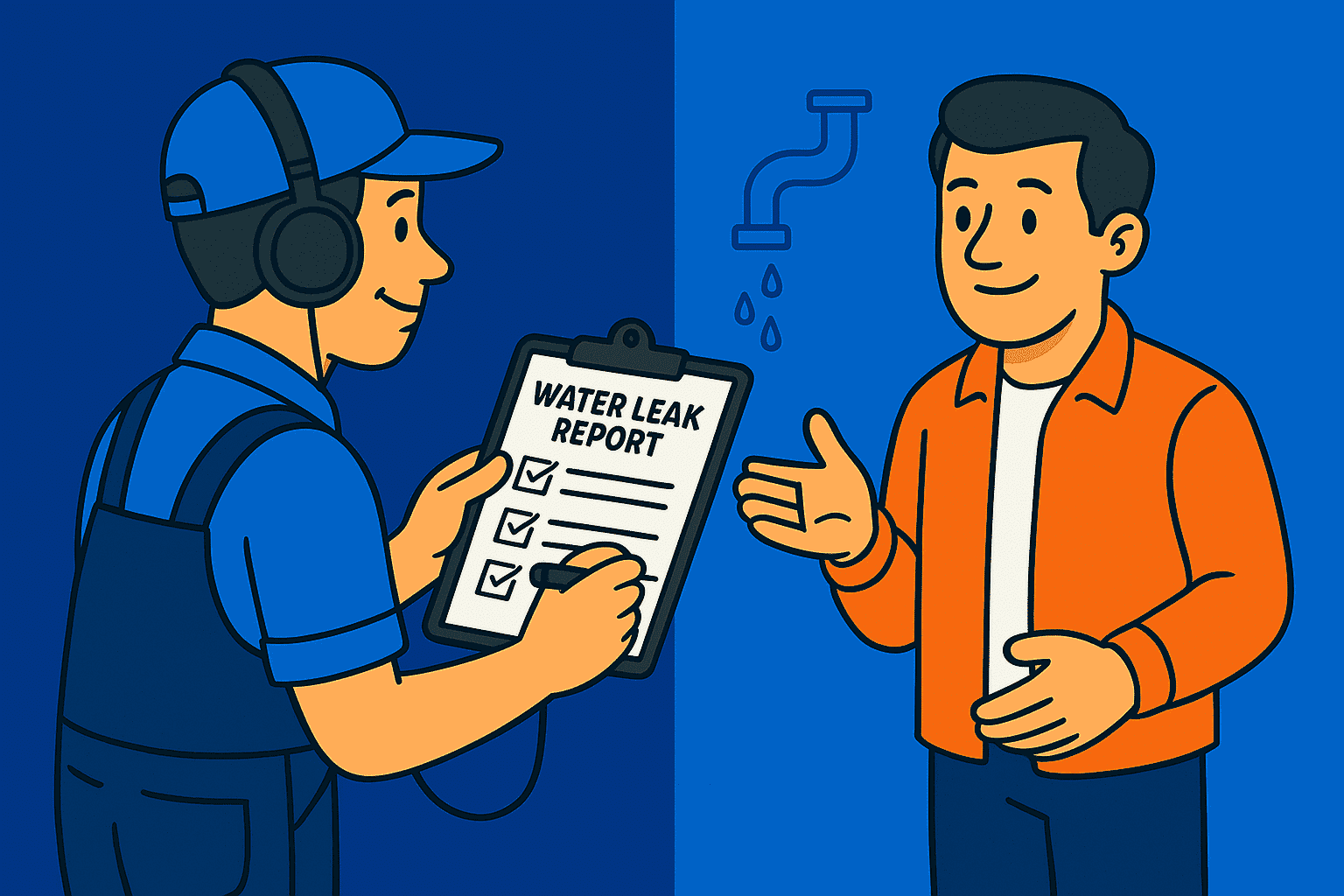Plumbing Leak Detection
Expert plumbing leak detection services for residential homes across Cornwall & Devon.
Let's Find Your Plumbing Leak
Fast Reply Within 10s – 20m 🚀
↓ Leak detection & Fixes ↓
Plumbing Leak Detection Services in Cornwall & Devon
Stop that hidden leak before it drains your wallet – with 30+ years finding plumbing leaks, I’ll pinpoint yours fast using non-invasive methods
📞 Call Now: 07822 025 911Got a plumbing leak that’s playing hide and seek? After four decades tracking down leaks across Cornwall and Devon, I can tell you this: the water always wins if you wait. That constant drip isn’t just annoying – it’s wasting water daily and potentially causing thousands in structural damage.
Whether it’s a pinhole leak behind your kitchen wall or a burst pipe under your concrete floor, my specialist leak detection equipment finds it without tearing your home apart. No guesswork, no unnecessary damage – just precise detection that saves you time and stress.
How I Detect Plumbing Leaks Without the Destruction
Think of fixing plumbing leaks like keyhole surgery for your pipes. Instead of the old “rip and hope” approach, I use three primary methods that work together like a detective team:
Acoustic Leak Detection
Sensitive microphones that hear water escaping under pressure – even through concrete. Perfect for pressurised mains pipes where water creates distinct frequencies (typically 500-2000Hz).
Thermal Imaging
FLIR cameras reveal temperature differences caused by leaking water. Brilliant for hot water pipes and underfloor heating systems where heat signatures are clear.
Tracer Gas
For the really stubborn leaks, I inject safe hydrogen/nitrogen mix that escapes through the tiniest cracks. Essential for concrete slab leaks where sound doesn’t travel well.

The 7 Warning Signs You’ve Got a Plumbing Leak
Here’s what I’ve learned to spot with plumbing and leak detection – catch these early and you’ll save thousands:
When all taps are off (check at night for accuracy)
Won’t shift – often the first sign of hidden leaks
In usage despite normal habits
Appearing on walls/ceilings
At certain taps throughout the property
When nothing’s turned on
Indicates hot water pipe leaks
⚠️ Quick Check You Can Do Right Now:
Turn off all water-using appliances. Check your water meter reading. Wait 2 hours without using any water. Check again. If it’s moved, you’ve got a leak – call me on 07822 025 911.
My Plumbing Leak Detection Process (What Actually Happens)
No smoke and mirrors here – this is exactly how I’ll find your leak:
Initial Phone Assessment & Quote (10-15 mins)
I’ll ask about your water pressure, meter readings, and visible signs. This helps me understand the problem and provide an accurate quote. No surprises – you’ll know exactly what to expect before we book.
On-Site Leak Detection (1-3 hours)
Once booked, I’ll arrive with all necessary equipment. Using acoustic detection, thermal detection, or tracer gas leak detection as needed, I’ll systematically locate your leak without unnecessary damage to your property.
Plumbing Leak Repair Recommendations & Report
Once found, I’ll show you exactly where the leak is and discuss plumbing leak repair options on-site. If you need an insurance report, I’ll prepare comprehensive documentation with photos and detailed findings that insurers accept. You’ll leave knowing exactly what needs doing.
Trace and Access Insurance Claims
Great news for homeowners: Most UK home insurance policies include Trace and Access Leak Detection cover. This means you can claim back the cost of leak detection services when you have an escape of water.
With 30+ years’ experience, I understand exactly what insurance companies require. I provide comprehensive reports with all necessary documentation to support your claim. Just check your policy includes “escape of water” coverage – most do.
Types of Plumbing Leaks I Find Daily
Supply Pipe Leaks
Your mains water pipe works under 3-4 bar pressure – when it fails, you know about it. Common culprits include corroded copper joints (especially pre-1980s properties), frost damage on external pipes, and ground movement cracking blue MDPE pipes. These need urgent attention as they can lose 1000+ litres daily.
Internal Plumbing Leaks
The sneaky ones hiding in your walls and floors. Push-fit fittings that weren’t pushed quite far enough, soldered joints failing after 20-30+ years, and compression fittings loosening from thermal expansion. Often found near radiators, under baths, and behind kitchen units.
Central Heating Leaks
If your boiler pressure drops weekly, you’ve likely got a heating system leak. Micro-leaks at radiator valves evaporate before you see them, corroded pipes under floors slowly weep, and manifolds on underfloor heating can develop hairline cracks.
Waste Pipe Leaks
Different beast entirely – no pressure means they’re harder to detect. Look for foul smells from under floors, intermittent damp patches after using specific appliances, and slow damage to ceiling below bathrooms. Often caused by poor installation or ground settlement.

Why Choose DCI Over a General Plumber?
Truth is, your local plumber’s great for fitting taps – but finding hidden leaks? That’s specialist territory. Here’s the difference:
Equipment investment
My detection kit represents years of investment in the best technology – because accuracy matters
Insurance reports
I know exactly what insurers need to approve claims (helped customers with thousands in successful claims)
Non-destructive methods
While others guess and dig, I pinpoint first – typically reducing repair disruption by 70%
30+ years experience
I’ve seen every pipe material, every installation bodge, every leak type – experience you can’t Google
Single focus
I don’t fit boilers or unblock drains – I find leaks. It’s all I do, so I do it properly
Plumbing Materials & Their Leak Patterns
Copper Pipes (Pre-1990s)
Still going strong in most cases, but watch for pinhole leaks from aggressive water, green verdigris at joints indicating slow leaks, and flux corrosion from poor installation. Usually leak at fittings rather than pipe body.
Plastic Pipes (1990s onwards)
Generally reliable but prone to rodent damage in lofts (yes, really), UV degradation if exposed to sunlight, and push-fit connections working loose. Biggest issue? Cowboys using plumbing fittings on heating systems.
Lead Pipes (Pre-1970s)
If you’ve still got lead supply pipes, leaks are the least of your worries. But they do split at ground movement points and develop pinhole leaks from internal corrosion. I always recommend full replacement for health reasons.
Galvanised Steel (1950s-1970s)
Rust from the inside out – when they go, they really go. Look for orange water, reduced flow before leaks appear, and multiple pinhole leaks appearing simultaneously. Always replace rather than patch.
Your Plumbing Leak Action Plan
Found signs of a leak? Here’s exactly what to do:
Turn off your stop tap
Usually under kitchen sink – if leak is severe
Move valuables
Away from affected areas
Take photos
Of any damage for insurance
Check your insurance policy
For Trace & Access cover
Call me on 07822 025 911
For immediate assistance
Don’t wait – small leaks become big problems faster than you’d think. One customer delayed 3 months and faced extensive structural repairs instead of a simple fix.
Preventing Future Plumbing Leaks
After 30+ years fixing leaks, here’s my advice for avoiding them:
Annual pressure test
Simple check that catches problems early
Insulate external pipes
Prevents 90% of frost damage
Install leak detection valves
Auto shut-off when leaks detected
Replace stop taps every 15 years
They seize when you need them most
Check under sinks monthly
Most leaks start small and visible
Environmental Impact (Why Quick Detection Matters)
Here’s something that might shock you: the average UK household leak wastes 5,500 litres annually. That’s:
Finding and fixing leaks isn’t just about protecting your property – it’s about protecting our environment. Every leak fixed helps preserve water for future generations.
Ready to Find That Leak?
Stop the damage. Stop the waste. Stop the worry. With the best detection equipment available, I’ll find your plumbing leak quickly and accurately with a plumbing leak test.
Remember: Every day that leak runs is causing damage and wasting water. One phone call to DCI Leak Detection could save your property from major damage.
Available 24/7 across Cornwall & Devon
Insurance-approved reports • Non-invasive detection • Expert leak detection
Serving Cornwall & Devon for Over 30+ years
Based in Saltash, I cover the entire Southwest region with rapid response times. Whether you’re in bustling Plymouth or rural Bodmin, I’ll get to you quickly with all the equipment needed to find your leak.
Professional Plumbing Leak Detection Services Across Cornwall & Devon
Providing expert leak detection services throughout the Southwest including:
Truro • Exeter • Plymouth • Torquay • Newquay • St Austell • Barnstaple • Bodmin • Penzance • Falmouth • Paignton • Camborne • Redruth • Tiverton • Newton Abbot • Helston • Brixham • St Ives • Launceston • Bideford • Liskeard • Saltash • Tavistock • Okehampton • Totnes • Kingsbridge • Wadebridge • Teignmouth • Hayle • Dartmouth
Frequently Asked Questions
What are the warning signs that I might have a hidden plumbing leak?
Several clues suggest a concealed leak. A water meter that continues to spin when no taps are running, a persistent musty smell, unexplained increases in your water usage, damp patches or peeling paint on walls and ceilings, reduced water pressure at certain taps, the sound of running water when nothing is on and warm spots on floors are all common indicators . If you notice any of these signs, book a professional leak‑detection service promptly to avoid the health risks and structural damage that long‑term leaks can cause.
How does professional leak detection work and what equipment do you use?
Modern leak detection is non‑destructive. We combine three main methods – sensitive acoustic microphones that pick up the sound of pressurised water escaping, thermal imaging cameras to show temperature differences from leaking hot pipes and tracer‑gas detection for stubborn leaks. These techniques mirror the best practices outlined by leading companies, which carry thermal imaging, acoustic detectors, moisture mapping and tracer‑gas equipment to every job. With over 40 years’ experience, we select the right method (or combination) for your property and always explain our approach before we start.
How much does plumbing leak detection cost, and will my insurance cover it?
Costs vary because each leak is different. Some specialists charge in half‑hour increments and may add fees for tracer gas and materials . A typical domestic leak in a hot or cold water pipe may take a few hours to locate and report. The good news is that most UK home insurance policies include “Trace & Access” cover. When this cover is in place, your insurer usually reimburses the cost of locating and exposing the leak . You’ll still need to pay for the actual repair to the pipe, but the cost of finding and accessing it is normally covered . We always discuss pricing up front and can advise you on making a claim.
Do you do commercial plumbing leak detection?
Yes, we are both residential and commercial leak detection specialists.
Will leak detection damage my property?
Non‑invasive leak detection is designed to minimise damage. In most cases we locate leaks through floors and walls without any cutting at all. Occasionally a small access hole (for example, to remove a bath panel or insert a borescope camera) is necessary to confirm a leak, but our aim is always to avoid speculative destruction. Before any intrusive work, we’ll discuss it with you and explain how it affects your insurance claim – speculative damage is usually not covered.
Will you need to turn off my water or heating?
For heating‑system leaks, it’s rare that we’ll need to isolate the water. However, for mains water leaks, our engineer often needs to shut off the supply briefly during pressure tests. We ask that no water is used (including toilets, washing machines or outside taps) while these tests run. If tracer gas is used, using water could allow the gas to escape and affect the test results. We’ll guide you through this on the day.
How long does leak detection take and will you need more than one visit?
Every job is different, but most domestic investigations are completed in one visit. A straightforward hot/cold water leak typically takes about half a day to locate and report. Heating‑system leaks can be more complex and may require most of a day. Second visits are rare and usually only needed if access was restricted or the pipe system is badly obstructed. We always allocate sufficient time and keep you updated throughout.
Do you repair the leak once it’s found?
Leak detection and repair are two distinct tasks. Like many specialists, we focus on finding the leak and providing a detailed report. Permanent repairs are classed as maintenance and are not covered under most trace‑and‑access policies. To avoid conflicts of interest, reputable leak detectors prefer not to carry out the final repair themselves. We’ll make a temporary fix where possible and recommend trusted local plumbers for the final repair. We can also advise on drying and restoration.
How should I prepare for your visit and what should I do while I’m waiting?
If a leak is severe, turn off your stop tap (usually under the kitchen sink) to minimise damage. Move valuables away from affected areas, take photographs of any damage for insurance and check your policy for trace‑and‑access cover. When the engineer arrives they may need clear access to stopcocks both inside and outside the property. During pressure or tracer‑gas tests it’s important not to use any water, including toilets and appliances. If you’re unsure where your stop tap is, we’ll help you locate it.
How can I prevent plumbing leaks in the future?
Routine maintenance saves money. Carry out annual pressure tests on your plumbing and heating systems; insulate external pipes to prevent frost damage; install leak‑detection shut‑off valves; replace stop taps every 15 years before they seize; and regularly check under sinks and around appliances for small drips. These simple steps, combined with prompt attention when you notice any of the warning signs above, help reduce the risk of serious leaks.
What sets your leak detection service apart from a general plumber?
General plumbers are excellent at fitting taps and repairing visible pipework, but tracing a hidden leak requires specialist tools and experience. Even industry guides note that while plumbers can detect some leaks, they often lack the equipment needed to trace hidden leaks and access the affected area. We have invested in a full suite of leak‑detection equipment and devoted 30+ years to perfecting our techniques. Because leak detection is our sole focus, we arrive ready to detect leaks quickly and provide the insurance‑approved documentation you need.
